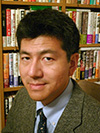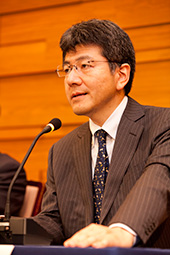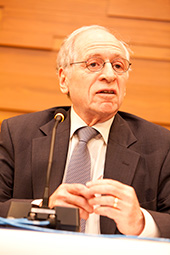This event now concluded. Report available here.
- Panelists: Takahara Akio (Professor, University of Tokyo), Gerald L. Curtis (Professor, Columbia University)
- Moderator: Akashi Yasushi (Chairman, International House of Japan)
- Date: Wednesday, April 16, 2014, 6:30-8:00 pm (Doors open at 6:00 pm)
- Venue: Iwasaki Koyata Memorial Hall, International House of Japan
- Language: Japanese (without English interpretation)
- Organized by The International House of Japan
- Admission: 1,000 yen (Students: 500 yen, IHJ members: Free)
- Capacity: 200 (reservation required, first-come first-served)
The situation in East Asia surrounding Japan, the United States, China, and Korea, is full of tension. How can these countries contribute to the making of a stable region beyond the interests of each nation? In this panel discussion, Professor Takahara Akio will first speak on the current situation in East Asia with a focus on China, and then Professor Gerald L. Curtis, who has just visited Korea and China, will share his observations on Japan and the recent US policy on East Asia. A question-and-answer session will follow the discussion.
Takahara Akio (Professor, University of Tokyo)
 Dr. Takahara received his DPhil from the University of Sussex. Previously worked at the Sasakawa Peace Foundation, the Japanese consulate in Hong Kong, J.F. Oberlin University, and Rikkyo University. He specializes in contemporary Chinese politics. In addition to his current post, he holds many positions including adjunct fellow at the Japan Institute of International Affairs and senior fellow at the Tokyo Foundation. His publications include Nitchu Kankei-shi (Modern History of Japan-China Relations; Yuhikaku Publishing, 2013 [eds.]), Higashi Ajia Anzen Hosho no Shin-tenkai (New Developments in Security in East Asia; Akashi Shoten, 2005 [eds.]), and The Politics of Wage Policy in Post-Revolutionary China (Macmillan, 1992).
Dr. Takahara received his DPhil from the University of Sussex. Previously worked at the Sasakawa Peace Foundation, the Japanese consulate in Hong Kong, J.F. Oberlin University, and Rikkyo University. He specializes in contemporary Chinese politics. In addition to his current post, he holds many positions including adjunct fellow at the Japan Institute of International Affairs and senior fellow at the Tokyo Foundation. His publications include Nitchu Kankei-shi (Modern History of Japan-China Relations; Yuhikaku Publishing, 2013 [eds.]), Higashi Ajia Anzen Hosho no Shin-tenkai (New Developments in Security in East Asia; Akashi Shoten, 2005 [eds.]), and The Politics of Wage Policy in Post-Revolutionary China (Macmillan, 1992).Gerald L. Curtis (Burgess Professor of Political Science, Columbia University; Distinguished Fellow, Tokyo Foundation)
 Dr. Curtis received a B.A. from the University of New Mexico, and an M.A. and Ph.D. from Columbia University. He has held appointments at many research institutions including the College de France, the Lee Kwan Yew School of Public Policy, Keio, Waseda and Tokyo Universities, and the Graduate Research Institute for Policy Studies. He is the recipient of numerous prizes and honors including Chunichi Shimbun Special Achievement Award, the Ohira Masayoshi Memorial Prize, the Japan Foundation Award, and the Order of the Rising Sun, Gold and Silver Star. The author of numerous books and articles published in both English and Japanese on Japanese politics, government, foreign policy, and US-Japan relations, including Politics and Sanma: 45 Years Living in Japan (Nikkei BP, 2008) and The Logic of Japanese Politics (Columbia University Press, 2000).
Dr. Curtis received a B.A. from the University of New Mexico, and an M.A. and Ph.D. from Columbia University. He has held appointments at many research institutions including the College de France, the Lee Kwan Yew School of Public Policy, Keio, Waseda and Tokyo Universities, and the Graduate Research Institute for Policy Studies. He is the recipient of numerous prizes and honors including Chunichi Shimbun Special Achievement Award, the Ohira Masayoshi Memorial Prize, the Japan Foundation Award, and the Order of the Rising Sun, Gold and Silver Star. The author of numerous books and articles published in both English and Japanese on Japanese politics, government, foreign policy, and US-Japan relations, including Politics and Sanma: 45 Years Living in Japan (Nikkei BP, 2008) and The Logic of Japanese Politics (Columbia University Press, 2000).Report
I-House Chairman Akashi Yasushi opened the program by pointing to the recent crisis in East Asia involving Japan, the United States, China, and South Korea, noting that even two years after new leaders entered office in Japan, South Korea, and China, Tokyo-Seoul and Tokyo-Beijing bilateral summits have yet to be held. Japan’s alliance partner, the United States, expressed its “disappointment” over Prime Minister Abe Shinzo’s visit to Yasukuni Shrine. And regional tensions are building over territorial disputes—involving the Senkaku Islands and Takeshima—and historical issues. The panel discussion was organized in the light of these regional challenges, based on the perceived need for urgent dialogue on approaches to promoting regional understanding and building a common future.
Panelists sharing their views were University of Tokyo Professor Takahara Akio, an expert on Chinese politics, and Columbia University Professor Gerald L. Curtis, who has observed Japanese politics for nearly half a century and had just returned from a trip to China and South Korea.
 Speaking first, Takahara noted that many of the problems that have emerged in the East Asian region have their roots in the rise of China, whose neighbors, including Japan, are benefitting from its economic growth but, at the same time, growing worried about Beijing’s military buildup and its increasing willingness to exert its will through a show of strength.
Speaking first, Takahara noted that many of the problems that have emerged in the East Asian region have their roots in the rise of China, whose neighbors, including Japan, are benefitting from its economic growth but, at the same time, growing worried about Beijing’s military buildup and its increasing willingness to exert its will through a show of strength.
Takahara commented that while there is great domestic dynamism in China due to the country’s rapid economic growth, important reforms have been delayed, leading to the entrenchment of social stratification and the widening of wealth gaps. This has driven Chinese President Xi Jinping to encourage nationalistic sentiment in an effort to redirect people’s growing frustrations toward external targets.
Obstacles to reform, Takahara said, include the fact that the military and vested interests form the mainstay of support for the two-and-a-half-year Xi regime and that the conservative left remains politically powerful. The hard-line stance in Xi’s foreign policy is thus likely to persist.
 Curtis, meanwhile, stated that Japanese diplomacy stands at a major crossroads owing to changes in the international situation. Three factors that will have a large bearing on Japan’s fate are: (1) the influence Abe has on shaping Japan’s foreign policy, (2) the respective attitudes of the partners regarding the Japan-US alliance, and (3) the Chinese view of this alliance.
Curtis, meanwhile, stated that Japanese diplomacy stands at a major crossroads owing to changes in the international situation. Three factors that will have a large bearing on Japan’s fate are: (1) the influence Abe has on shaping Japan’s foreign policy, (2) the respective attitudes of the partners regarding the Japan-US alliance, and (3) the Chinese view of this alliance.
First of all, regarding Abe’s impact on Japanese foreign policy, Curtis noted that it is not as large as generally perceived, as the prime minister is largely following the direction set by the Democratic Party of Japan administrations that preceded him. The lack of finesse in handling historical issues and the debate over the right of collective self-defense are his own creations, though, and require a more strategic, level-headed approach.
Next, regarding the Japan-US alliance, both Japan and the United States harbor anxieties about their alliance partner in the light of heightening tensions in East Asia over the Senkakus and other issues. Curtis emphasized, though, that the importance of the alliance for Washington’s Asia strategy will remain fundamentally unchanged, regardless of who is in the White House. He encouraged frank dialogue at the summit level to dispel many of the unnecessary anxieties on both sides.
And for the last factor, China’s view of the Japan-US alliance, Curtis pointed out that it has been Beijing’s policy throughout the postwar era not to criticize the bilateral security arrangement, as it was thought to prevent Japan’s remilitarization. This, he noted, does not mean Beijing endorses the alliance; it simply reflects the realistic acknowledgement that criticism will not make any difference. China does have an interest, though, in weakening Japan’s ties with the United States.
Regarding the cooling of Japan-China relations, Curtis emphasized the need for both countries to take a flexible approach and make pragmatic decisions, while Takahara pointed to the importance of maintaining economic and cultural ties with an eye toward the long term. The two experts agreed that Japan, the United States, China, and South Korea are all important players in the region and that the souring of the relationship between any two parties is bound to have an impact on overall relations. They expressed the hope that all leaders would take level-headed policy decisions that contribute to the region’s peace and prosperity.